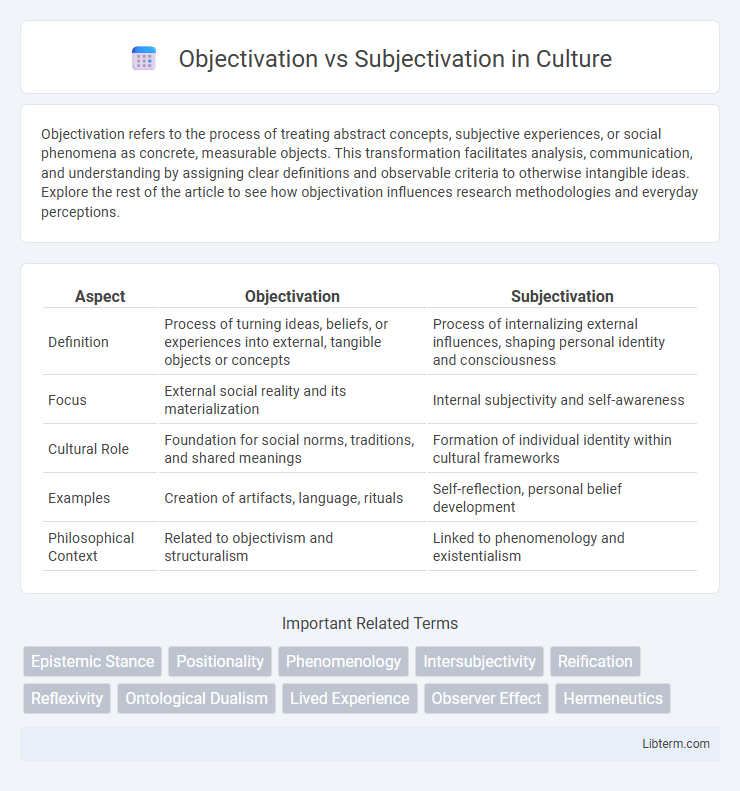Objectivation refers to the process of treating abstract concepts, subjective experiences, or social phenomena as concrete, measurable objects. This transformation facilitates analysis, communication, and understanding by assigning clear definitions and observable criteria to otherwise intangible ideas. Explore the rest of the article to see how objectivation influences research methodologies and everyday perceptions.
Table of Comparison
| Aspect | Objectivation | Subjectivation |
|---|---|---|
| Definition | Process of turning ideas, beliefs, or experiences into external, tangible objects or concepts | Process of internalizing external influences, shaping personal identity and consciousness |
| Focus | External social reality and its materialization | Internal subjectivity and self-awareness |
| Cultural Role | Foundation for social norms, traditions, and shared meanings | Formation of individual identity within cultural frameworks |
| Examples | Creation of artifacts, language, rituals | Self-reflection, personal belief development |
| Philosophical Context | Related to objectivism and structuralism | Linked to phenomenology and existentialism |
Understanding Objectivation: Definition and Concepts
Objectivation refers to the process by which social phenomena, ideas, or experiences become recognized as objective realities independent of individual consciousness. It involves the externalization of subjective meanings into social facts, thereby gaining a status that appears as given or fixed within a cultural or social context. Key concepts in objectivation include reification, institutionalization, and the transformation of shared meanings into tangible structures or norms.
Exploring Subjectivation: Meaning and Frameworks
Subjectivation refers to the process through which individuals become subjects by internalizing cultural norms, beliefs, and power structures, shaping their identity and agency. Frameworks such as Foucault's theories emphasize how subjectivation involves both self-formation and subjection to external discourses and practices. Understanding subjectivation enables the analysis of how personal and social identities are constructed within specific historical and social contexts.
Key Differences Between Objectivation and Subjectivation
Objectivation refers to the process of transforming subjective experiences into objective facts or knowledge, emphasizing external observation and measurable reality. Subjectivation involves the formation of individual identity and self-awareness through internal reflection and social interactions. Key differences lie in objectivation's focus on depersonalized, collective understanding versus subjectivation's emphasis on personal, internal experience and agency.
Historical Perspectives on Objectivation and Subjectivation
Historical perspectives on objectivation trace back to classical philosophy, where thinkers like Kant emphasized the process of making knowledge objective and universal. Subjectivation has roots in existentialism and phenomenology, highlighting individual experience and self-awareness as central to identity formation. These contrasting frameworks reflect ongoing debates between external realities shaping individuals and personal consciousness constructing meaning.
Objectivation in Social Sciences and Philosophy
Objectivation in social sciences refers to the process through which social phenomena become perceived as objective realities independent of individual consciousness, shaping societal structures and cultural norms. In philosophy, objectivation involves transforming subjective experiences into external, measurable entities, facilitating the analysis of human behavior and social relations. This concept is pivotal in understanding how collective meanings and social facts gain an autonomous existence beyond personal interpretations.
Subjectivation in Psychological and Cultural Contexts
Subjectivation in psychological contexts involves the process through which individuals form their self-identity and internalize societal norms, shaping personal consciousness and subjective experience. In cultural studies, subjectivation highlights how social power structures influence individual agency and identity construction within a given cultural framework. This concept emphasizes the dynamic interaction between external cultural forces and internal psychological processes in the development of the self.
Impact of Objectivation on Identity and Agency
Objectivation transforms individuals into fixed categories, limiting personal identity by enforcing external labels and social roles that overshadow self-perception and fluidity. This process reduces agency by constraining decision-making and self-expression within predetermined frameworks dictated by societal norms or institutional expectations. As a result, objectivation can diminish autonomy and suppress the dynamic construction of identity, restricting individuals to externally imposed definitions.
Role of Subjectivation in Personal and Collective Experiences
Subjectivation plays a crucial role in shaping both personal and collective experiences by emphasizing individual agency, identity formation, and subjective interpretation of reality. It enables people to internalize social norms, values, and power structures while simultaneously allowing for resistance and self-expression within cultural contexts. This dynamic process influences social cohesion, cultural diversity, and the formation of collective memory.
Objectivation vs Subjectivation: Implications for Modern Society
Objectivation refers to the process by which subjective experiences are concretized into objective realities, shaping social institutions and norms, while subjectivation emphasizes individual agency and the internalization of norms shaping personal identity. The tension between objectivation and subjectivation in modern society influences power structures, social control mechanisms, and the formation of collective consciousness. Understanding this dynamic is crucial for addressing issues of autonomy, social integration, and the balance between institutional authority and individual freedom in contemporary governance and cultural discourse.
Navigating the Balance: Integrating Objectivation and Subjectivation
Navigating the balance between objectivation and subjectivation is crucial for holistic understanding in social sciences and humanities. Objectivation involves externalizing knowledge into objective frameworks, while subjectivation emphasizes personal experience and internal meaning-making. Integrating both processes enriches analysis by combining empirical data with individual perspectives, fostering comprehensive insights.
Objectivation Infographic

 libterm.com
libterm.com